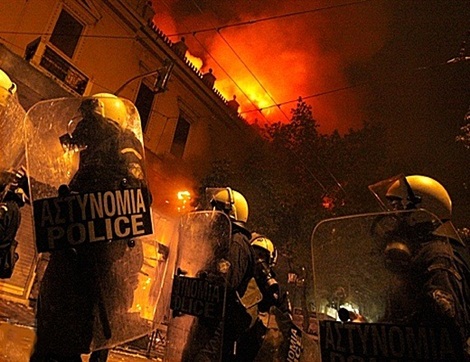
By Peter Papaherakles
Over 100,000 protesters gathered in front of Parliament to protest the signing of yet another debt restructure agreement on Feb.12. Gangs of hooligans also showed up to loot shops and burn down cultural landmarks. At least 45 buildings were burned down including the Attikon, one of the oldest cinemas in Athens, and dozens of stores were smashed and looted as the now routine exchange of Molotov cocktails and battles with riot police raged on. This time the violence was much worse, with seventy arrested and over a hundred injured. The hooligans were better prepared this time, as half the injuries were sustained by police.


The crowd protested against even deeper austerity measures and demanded Greece’s exit from the European Union. Once again their demands were ignored by the 300 MPs gathered inside the Parliament building for a midnight vote, as 199 voted for the new agreement.
European bank-appointed PM Lucas Papademos made a long speech on the Parliament floor about the urgent need to pass the fiscal plan which would secure the next loan of €130 billion ($170 billion) for Greece. Greece is now forced to accept even harsher austerity measures with every installment of the bail-out package.
In his speech, Papademos put forth a veiled ultimatum of a grim future and a chaotic bankruptcy with massive unemployment and poverty, exile and isolation from Europe, if Parliament voted against the bill. If passed, he promised a long, hard recovery with much sacrifice that would have Greece turning the corner in two or three years. He told them to think about their children’s future, their country’s greatness and other such lofty ideals.
Similar promises were made two years ago by PM George Papandreou, yet sacrifices Greeks have made since then have only led to the disintegration of their country. In order to secure the loan, the government had to agree to comply with a 43-page document called Memorandum of Understanding ( MOU ) that will not only intensify the sacrifices of ordinary working people but effectively hand the control of Greece’s economy over to foreign banks and corporations.


MOU has been described by critics “as calculating and mercenary as anything ever written.” Not only will Greece not get a single euro until it reaches certain impossible benchmarks, but it’s sovereignty is totally stripped away as the Greeks can only watch while of their nation’s wealth is being stolen by foreign banks and corporations.
In a country with a higher cost of living than that of the U.S., average wages have plummeted to €400, ($520) per month while taxes have increased drastically, pensions slashed and youth unemployment is around 50%. Now, most Greeks will have to make do with even less, with the hope of a silver lining at the end of the rainbow. MPs, on the other hand, live very comfortably on a salary of €8,594 ($11,172) per month with numerous perks and many have billions stashed away in offshore accounts.
The financial markets, ever indifferent to the public’s plight, showed an uptick as fears of a euro demise were temporarily postponed. The Greek default, of course, is inevitable and it is hard to guarantee the MPs personal safety in a country whose citizens have now become aware of their government’s great betrayal. Recently, several MPs have been attacked by angry crowds, and as Greeks are becoming reduced to basic survival, the MPs should take note. As the old song goes, “When you got nothing, you got nothing to lose.”
——
Pete Papaherakles, a U.S. citizen since 1986, was born in Greece. He is AFP’s outreach director. If you would like to see AFP speakers at your rally, contact Pete at 202-544-5977.

